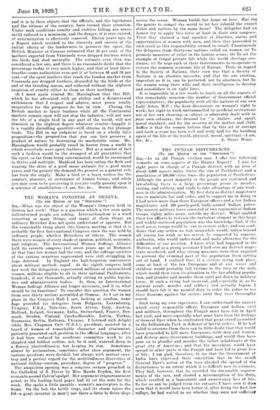THE WOMAN'S CONGRESS AT GENEVA.
[TO THE EDITOR OF THE " SPECTATOR.")
Sia,—What was the object of the Woman's Congress held in Geneva last week? That is a question which a few even quite well-informed people are asking. Internationalism is a word connoting so many things, and many of them things an ordinary Britisher does not quite understand or approve. But the remarkable thing about this Geneva meeting is that it is probably the first International Congress since the war held by ordinary people, whether Britishers a others. The women there were women of every shade of opinion, political, economic, and religious. The International Woman Suffrage Alliance held its seventh congress just seven years ago at Budapest. At that time few women had the vote, and the suffrage societies of the various countries represented were still struggling in
hope deferred. In England the half-forgotten controversy about militant methods raged. At the eighth congress held last week the delegations represented millions of enfranchised women, millions eligible to sit in their national Parliaments, hundreds, if not thousands, actually sitting on public legisla- tive and administrative bodies. Is, then, an International Woman Suffrage Alliance any longer necessary, and if so, what should be its-functions? To consider this question the women from over thirty nations assembled at Geneva. As I sat in my place in the Congress Hall I saw, looking at random, name flags provided for delegates from Bulgaria, Luxembourg, Uruguay, U.S.A., Palestine, South Africa, Italy, Austria, Holland, Iceland, Germany, India, Switzerland, France, Den- mark, Sweden, Finland, Czecho-Slovakia, Latvia, Turkey, Roumania, Serbia, Esthonia, Ukraine. I listened with delight while Mrs. Chapman Catt (U.S.A.), president, assisted by a board of women of remarkable character and attainment, patiently presented each problem in the official languages, after it had been reduced by assiduous committee work to its simplest and boldest outline, not, be it said, watered down to a flowery platitudinosity, but keeping its vim. Sometimes almost by acclamation, sometimes after close argument, the various questions were decided, but always with mutual cour- tesy and a perfect regard for the multitudinous diversities of national feeling—custom, procedure, degree of "progress."
The auspicious opening was a congress sermon preached in
the Cathedral of S. Pierre by Miss Mande Royden, the first womanto ascend Calvin'spulpit. Her argument (vigoureusenzent pease, as the leading local paper had it) set the note for the week. She spoke a little parable : woman's masterpiece is the home. On the hob the kettle sings, and its steam raises the lid—a great inventor (a man!) saw there a force to drive ships
across the ocean. Woman builds her home on love. Has she the genius to compel the world to let her rebuild the ruined states and nations by the same force? The delegates had an honest try to apply this force at least in their own congress. First they claimed a real equality of liberties, status and
opportunities of women with men, and then they proceeded to such work as this responsibility seemed to entail. Unanimously the delegates from thirty-one nations called on women (a) To promote measures of relief in the famine areas; (b) To set the example of frugal private life while the world shortage con- tinues; (c) To urge each of their Governments to oo-operate to restore the common economic life of Europe. Then, in regard to the Society of Nations, their view was that a Society of Nations is an absolute necessity, and that the one existing, imperfect as it is, can be perfected, not by aloofness, but by the women using their wills and their intelligence to develop and consolidate it on right lines.
It is impossible in a few words to touch on all the aspects of this remarkable occasion—the number of Government official representatives; the popularity with all the nations of our own Lady Astor, M.P.; the keen discussions on woman's right to work; her right to work untrammelled by artificial restrictions not of her own choosing—a subject so admirably dealt with in your own columns; the demand for " a higher, and equal, moral standard; and for the security of the mother and child. Suffice it that the women believe that by this act of courage and faith a stone has been well and truly laid for the building again of the life of the world, physical, moral, spiritual.—I am,






































 Previous page
Previous page